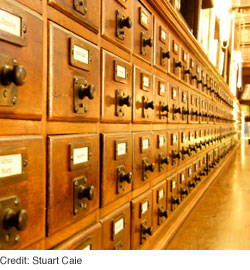 Note: I wrote this post to help explain the concept of metadata and how it can be used to improve free primary law sources. This post focuses on statutes, next week I will discuss applying these principles to opinions.
Note: I wrote this post to help explain the concept of metadata and how it can be used to improve free primary law sources. This post focuses on statutes, next week I will discuss applying these principles to opinions.
The simplest way to explain metadata is “data about the data.” Metadata can describe, among other things, the purpose, date of creation, location, means of creation, and standards used in the data. For example, when you take a picture with a digital camera, the image also contains information about the camera used to take the picture, the time and date, image resolution, etc. When you upload that picture to, say, Picasa, you’ll see this information. Picasa knows what type of camera you used because that data is embedded in the image itself.
The Dewey Decimal System is an example of metadata. Along the spine of a book is a number. That number is associated with a classification system – placing it within a catalog of records that contains “data about the data” (subject, author, title, number of pages, publisher, ISBN number, etc.) which in turn helps patrons find what they’re looking for.
 We told you about our nice free case law summaries. Then we blogged that we were adding more. Well, today, my friends, we are done. We have all fifty states!
We told you about our nice free case law summaries. Then we blogged that we were adding more. Well, today, my friends, we are done. We have all fifty states!


 Folks, it’s pledge week here at the Justia Blog. Want to support free law?
Folks, it’s pledge week here at the Justia Blog. Want to support free law? 


